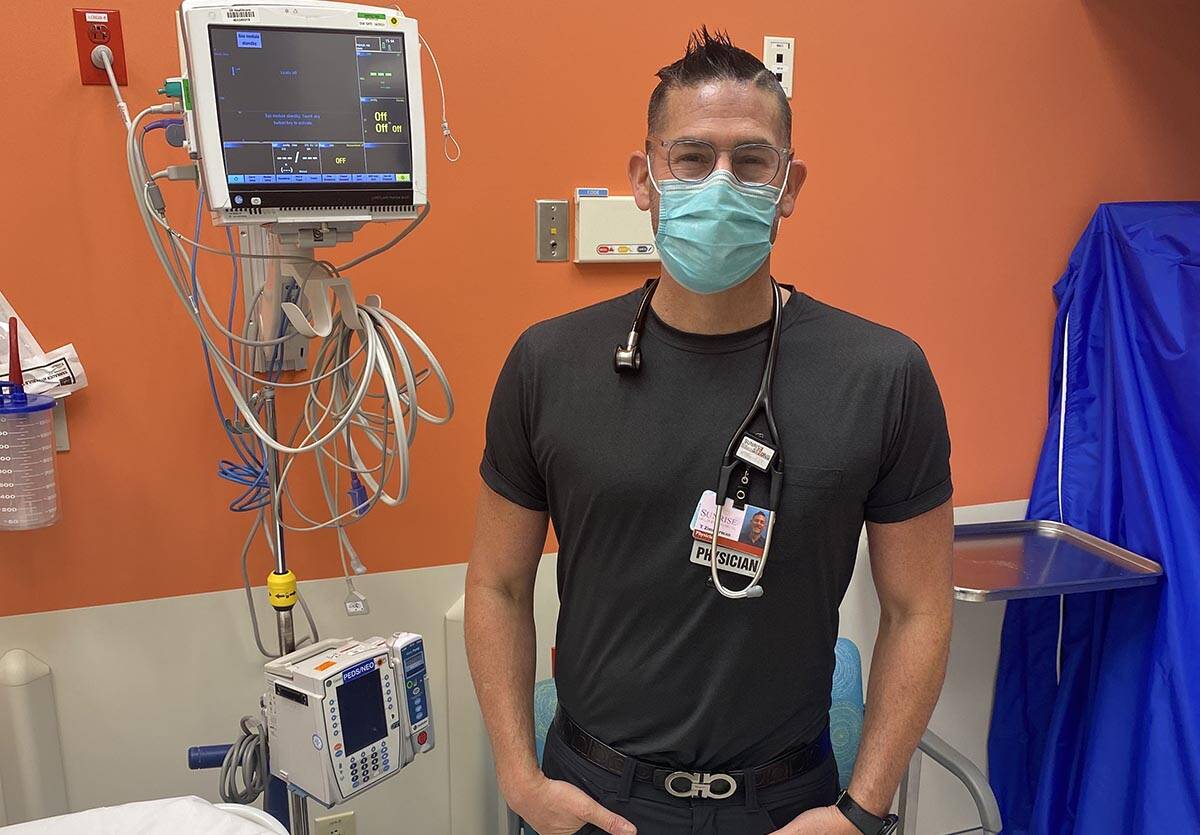Valley doctors urge parents: Get your children vaccinated
When parents remain on the fence about getting their children vaccinated against COVID-19, Las Vegas pediatrician Todd Zimmerman informs them that his family, including his two teenagers, have all gotten their shots.
“That has helped put people over the goal line,” said Zimmerman, medical director for the emergency room at Sunrise Children’s Hospital.
Conversations such as this have taken on critical importance, Zimmerman and other Las Vegas-area pediatricians say, as they see increasing numbers of cases and hospitalizations involving kids with COVID-19, the sickest of whom are almost always unvaccinated.
These observations mirror findings in a report released Friday by the Centers for Disease Control and Prevention showing that hospitalizations of children with COVID-19 increased fivefold since late June. In kids 12 to 17, the population eligible for vaccination, hospitalization rates for COVID-19 were 10 times higher in those who were unvaccinated.
“From what I have noticed myself, a lot of the ones with the bad pneumonias that tend to be the older adolescents and teenagers, they are not vaccinated,” said Dr. Rita Shah, a pediatric infectious disease specialist who treats patients at UMC Children’s Hospital and other area hospitals.
Shah described what it’s like to see children who likely wouldn’t be in the hospital if they had been vaccinated.
“It’s awful,” said Shah, whose twin 15-year-olds are vaccinated.
“We want our patients to be healthy. We’re here to help them,” she said. “We have been doing our best, as you know, for more than a year and a half. But it’s difficult when certain families don’t want to listen to science, and even when we try to answer their questions, they still are worried about getting a vaccine.”
Dr. Evelyn Montalvo Stanton, a pediatric pulmonologist and chair of pediatrics at the Kirk Kerkorian School of Medicine at UNLV, echoed Shah’s concern.
A couple, both of whom had been hospitalized for COVID-19, did not initially see a need to get their 16-year-old son with asthma vaccinated, she said. She eventually impressed upon them that their son could still catch the virus, even though his parents had already had it, and that he might become sicker than they had been.
“I had to make them understand the seriousness of the disease,” she said.
‘Long COVID’ in kids
Many kids who get COVID-19 will experience mild symptoms often similar to those of a cold, such as a runny nose and cough. Some experience digestive symptoms.
“But COVID can really affect any part of the body — the lungs, the heart,” said Dr. Rebecca Meyers, who treats patients at the UNLV Pediatric Clinic. “It can even affect children’s brains, giving them a variety of different kinds of neurological symptoms. It can make children tired, give them headaches. It can even cause them to have behavioral problems. So there’s lots of possible consequences of COVID infection in children beyond just what we typically see, which is a cold-like or flu-like illness.”
Just as adults can experience ongoing symptoms from COVID-19 — so-called “long COVID” — so can children. “Some of those kids can definitely have mental health or behavioral consequences,” Meyers said.
Typically, children or adolescents who are hospitalized for COVID-19 have an underlying condition such as obesity or asthma, Shah said. However, a rare condition called multisystem inflammatory syndrome, or MIS-C, can make previously healthy children very sick.
Seventy-nine children in Clark County have been diagnosed with the syndrome, which causes inflammation in multiple organs of some young patients previously infected with COVID-19, according to data from the Southern Nevada Health District.
‘People are scared’
Meyers said the biggest uptick in cases that she’s seeing is in school-age children.
“This surge for everybody, but particularly for children, began really to pick up in July, and is continuing to trend up and up … especially in the school-age group from around 5 years old to 17,” she said.
A vaccine has not yet been authorized for those under age 12, but if parents and others around them are vaccinated, younger children are less likely to become ill themselves, she said.
Data in a second report released by the CDC Friday showed that there were more COVID-19 pediatric emergency department visits and hospital admissions in states with lower vaccination rates, adding to evidence that broad community vaccination protects those who can’t be vaccinated.
As of Thursday, the health district had reported 237 hospitalizations for COVID-19 and four deaths in those ages 5 to 17 in Clark County. In children age 4 and younger, there had been 130 hospitalizations and one death.
“This is a pandemic. People are scared,” Zimmerman said. Adding to parents’ fear is inaccurate information from unreliable internet sources.
“But we keep pushing the same message. … In fact, this is the most studied vaccine ever. And we know it’s safe,” he said. “I follow the CDC very closely. I am always looking at the new studies. If it’s not every day, it’s every week that there’s more studies coming out that not only show the efficacy of the vaccine, but also the safety of the vaccine.”
Contact Mary Hynes at mhynes@reviewjournal.com or 702-383-0336. Follow @MaryHynes1 on Twitter.

















